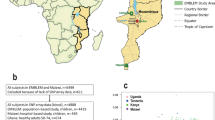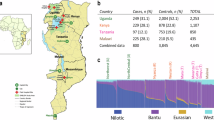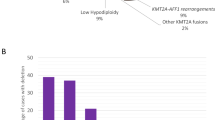Abstract
A CONSISTENT structural abnormality of chromosome 14—an extra band at the terminal of the long arm—has been found in 10 out of 12 African Burkitt lymphomas1. We report here a similar long acrocentric marker chromosome derived from chromosome 14 in other types of malignant lymphoma.
This is a preview of subscription content, access via your institution
Access options
Subscribe to this journal
Receive 51 print issues and online access
$199.00 per year
only $3.90 per issue
Buy this article
- Purchase on SpringerLink
- Instant access to the full article PDF.
USD 39.95
Prices may be subject to local taxes which are calculated during checkout
Similar content being viewed by others
References
Manolov, G., and Manolova, Y., Nature, 237, 33–34 (1972).
Sumner, A. T., Evans, H. J., and Buckland, R. A., Nature new Biol., 232, 31–32 (1971).
Hecht, F., McCaw, B. K., and Koler, R. D., New Engl. J. Med., 289, 286–291 (1973).
McCaw, B. K., Hecht, F., Harnden, D. G., and Teplitz, R. L., Proc. natn. Acad. Sci. U.S.A., 72, 2071–2075 (1975).
Author information
Authors and Affiliations
Rights and permissions
About this article
Cite this article
FUKUHARA, S., SHIRAKAWA, S. & UCHINO, H. Specific marker chromosome 14 in malignant lymphomas. Nature 259, 210–211 (1976). https://doi.org/10.1038/259210a0
Received:
Accepted:
Issue date:
DOI: https://doi.org/10.1038/259210a0
This article is cited by
-
Chromosome abnormalities in peripheral blood lymphocytes from untreated Hodgkin's patients
Human Genetics (1988)
-
Translocation 8;14 in an ataxia telangiectasia-derived cell line
Nature (1979)
-
Persistence of nucleolar RNA-rich structures and Ph1 duplication in the blastic crisis of chronic myeloid leukaemia
La Ricerca in Clinica e in Laboratorio (1979)
-
Significance of 14q translocations in non-Hodgkin lymphomas
Virchows Archiv B Cell Pathology (1978)



